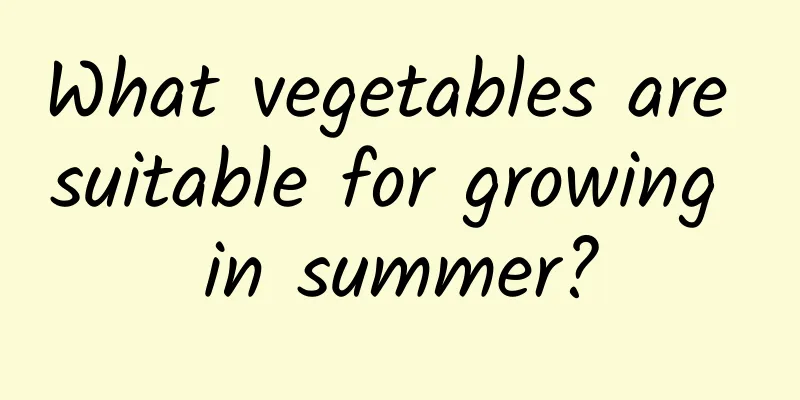What vegetables are suitable for growing in summer?

|
Summer is suitable for growing disease-resistant, heat-resistant and high-yielding vegetables, such as radish, spinach, lettuce, leek, Chinese cabbage, cabbage, rapeseed, chrysanthemum, chicken feather vegetable, wood ear vegetable, amaranth, cucumber, lettuce, cowpea, green beans, etc. 1. Cucumber Cucumbers like warmth and are not resistant to low temperatures. The suitable growth temperature is 20-25℃. Excellent varieties can grow normally in a high temperature of 35 degrees, and photosynthesis is not affected. If there is continuous high temperature and drought weather, appropriate watering is needed to keep the soil moist. 2. Chinese Cabbage Chinese cabbage is suitable for planting in early to mid-August, with a growing period of about 60 days. It can be harvested in October. The planting of Chinese cabbage is relatively complicated. Seedlings must be raised in advance and then planted at a spacing of about 50 cm. Pay attention to weeding and disease prevention during the growth period. 3. Chrysanthemum Chrysanthemum chrysanthemum has few diseases and pests, and its growing period is short, so it is suitable for planting in summer. It can be sown when the temperature is above 20℃. It can be broadcasted or sown in rows. Cover with 1 cm of soil after sowing. The growing period is 35-45 days. It can be harvested when the plant height is 15-20 cm, or you can pinch the young stems and wait for the second harvest. 4. Radish Radishes grow relatively fast and are a type of fast-growing vegetables. Six-leaf radishes are sown in early August, usually in rows. They will emerge in about 4-5 days and can be transplanted with a spacing of 8-10 cm between them. A small amount of fertilizer is applied to keep the soil moist and they can be harvested at the end of September. Tips for growing vegetables in summer1. Improve the soil: Usually, when farmers grow vegetables in summer, they will find that the leaves of the vegetables turn yellow and become smaller. This is actually due to soil salinization. The soil can be improved by applying microbial agents and using organic nutrients such as chitin, alginate, and amino acids. 2. Prevent sunscald: Sunscald is a common phenomenon in which vegetables are damaged by high temperatures. You can prevent it by blocking light, or watering the vegetables in time when water evaporation is large, or supplementing trace elements in time to avoid physiological diseases of vegetables due to calcium deficiency after a long period of cloudy weather. 3. Ensure water supply balance: When growing vegetables in summer, it is easy to have water supply imbalance problems, which will cause the vegetables to wilt. Therefore, farmers should do a good job of root care in daily management, ensure balanced nutrition, water appropriately, and also add alginate, amino acids, etc. to improve the heat resistance of the plants. |
<<: What vegetables are best to grow in May?
>>: What vegetables are suitable for planting in June?
Recommend
How to prepare soil for calamus? How to prepare soil for potted calamus?
Requirements for preparation of calamus soil Acor...
How to plant cyclamen seeds
1. Planting conditions ① Time: September to Octob...
Disease and Pest Control of Toona Sinensis
Toona sinensis powdery mildew The distribution of...
How to grow aloe vera more vigorously?
As a common household potted plant, aloe vera is ...
How to cultivate cardinal coral beautifully
Cardinal coral growth conditions Cardinal coral l...
What's the matter with camellia having flower buds but not blooming? How to fertilize and manage when there are flower buds?
1. What if there are flower buds but no flowers b...
How to grow potted peony? Cultivation methods and maintenance matters
Peony potted cultivation method 1. Potting soil: ...
These 6 kinds of flowers will bloom with just a little water, a must-have for lazy people
1. Smooth sailing with hydroponics Procedure 1. R...
Cultivation methods and precautions of Trillium
1. Soil Mountain yellow loam is often used to gro...
Which month is the best for planting broccoli and when is the best time for raising seedlings?
Which month is suitable for planting broccoli? Br...
How and when to plant peas
Pea planting time and month Peas are planted outd...
Foreigners also like Chinese bonsai, but they actually grow them like this, I'm dumbfounded...
Various kinds of succulent bonsai There is a fore...
Where does wax apple grow?
1. Where do you grow? Wax apple grows in Guangdon...
How to cut the green radish in hydroponics
1. Cutting method 1. To grow green radish in wate...
Breeding methods and precautions of Belgian azalea
1. Breeding methods 1. Soil: You should choose so...









